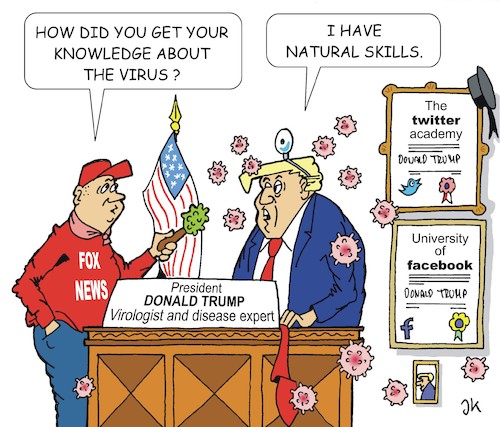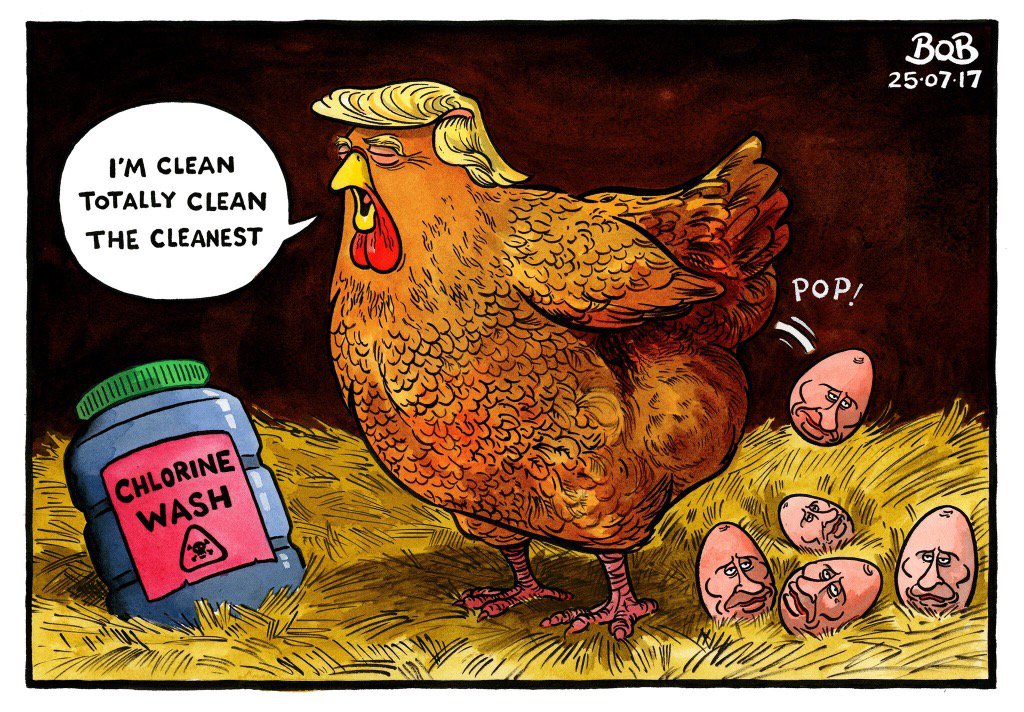






Three times last week, Donald Trump defied expert advice and touted anecdotal evidence that the anti-malaria drug chloroquine might cure Covid-19. “It’s been around for a long time,” the president said on Thursday, “so we know that if things don’t go as planned, it’s not going to kill anybody.”
On Sunday, a couple in Arizona who had heard the president describe the drug on television,
and were afraid of dying from Covid-19, discovered that they had a
non-medical version of the chemical chloroquine phosphate, used to clean
fish tanks, among their pet supplies. Mistakenly believing that the
chemical sold to pet owners, which is available online, was exactly the
same as the anti-malaria drug prescribed for humans — it is not — the
man, who was 68, and his wife, who was 61, tried to self-medicate by mixing one teaspoon of the bitter tasting chemical with soda and swallowing it.
Within 30 minutes, both fell ill and had to be rushed to a Phoenix-area hospital, where the man died and his wife remains under critical care.
Within 30 minutes, both fell ill and had to be rushed to a Phoenix-area hospital, where the man died and his wife remains under critical care.
 Read Our Complete CoverageThe Coronavirus Crisis
Read Our Complete CoverageThe Coronavirus Crisis
Trump’s
press conference statement about the possible benefit of the form of
chloroquine prescribed by doctors for malaria “was on a lot,” the woman told Vaughn Hillyard of NBC News
by phone from her hospital bed. “They kept saying that it was approved
for other things and, you know, Trump kept saying it was basically
pretty much a cure.”
“I
was in the pantry stacking dog food and I just saw it sitting in the
back shelf and thought, ‘Hey, isn’t that the stuff they’re talking about
on TV?'” the woman said.
Asked what her message to the American people would be from her devastating experience, the woman said: “Don’t believe anything the President says, and his people, because they don’t know what they’re talking about. And don’t take anything — be so careful — and call your doctor. I mean, this is a heartache I’ll never get over.”
“Given the uncertainty around Covid-19, we understand that people are trying to find new ways to prevent or treat this virus, but self-medicating is not the way to do so,” Dr. Daniel Brooks, the medical director of the Banner Poison and Drug Information Center in Phoenix, said in a statement.
Last Thursday, the social-media news agency Storyful reported that bottles of the chemical commonly used in aquariums had shot up in price on eBay from the usual $9.99 to hundreds of dollars.
Asked what her message to the American people would be from her devastating experience, the woman said: “Don’t believe anything the President says, and his people, because they don’t know what they’re talking about. And don’t take anything — be so careful — and call your doctor. I mean, this is a heartache I’ll never get over.”
“Given the uncertainty around Covid-19, we understand that people are trying to find new ways to prevent or treat this virus, but self-medicating is not the way to do so,” Dr. Daniel Brooks, the medical director of the Banner Poison and Drug Information Center in Phoenix, said in a statement.
Last Thursday, the social-media news agency Storyful reported that bottles of the chemical commonly used in aquariums had shot up in price on eBay from the usual $9.99 to hundreds of dollars.
A
spokesperson for the hospital that treated the couple said that she did
not know where they got the incorrect idea that the chloroquine
phosphate used to clean aquariums was safe for human consumption, but a
New York Post headline that popped up on Google on Thursday read: “Fish
tank additive could treat coronavirus, studies say.” The headline on the Post’s website still reads: “Sales of fish tank additive skyrocket after studies say it could treat coronavirus.” A headline on the Fox News website
last week also blurred the difference between the drug used by doctors
and the chemical available at pet stores. “Drug cleared by Trump, FDA
for coronavirus testing also found in fish tanks,” Fox told its readers.
Brooks told The Arizona Republic that his group’s poison centers were getting calls from people asking if they can use medications or household products to treat Covid-19. Some of the calls were about chloroquine, prompted by what Brooks called, “misinformation that they’re obtaining from the interweb and television.”
Since the Centers for Disease Control says on its website that the active ingredient in the antimalarial drug referred to as choloroquine is chloroquine phosphate, it is not hard to see how desperate, worried people with access to the internet but no medical knowledge could convince themselves to swallow a form of that chemical used to kill parasites on fish, even if it was labeled “not for human consumption.”
Brooks told The Arizona Republic that his group’s poison centers were getting calls from people asking if they can use medications or household products to treat Covid-19. Some of the calls were about chloroquine, prompted by what Brooks called, “misinformation that they’re obtaining from the interweb and television.”
Since the Centers for Disease Control says on its website that the active ingredient in the antimalarial drug referred to as choloroquine is chloroquine phosphate, it is not hard to see how desperate, worried people with access to the internet but no medical knowledge could convince themselves to swallow a form of that chemical used to kill parasites on fish, even if it was labeled “not for human consumption.”

A screenshot of the label on a chemical sold to pet owners to kill parasites on fish kept in aquariums.
Nigeria also reported two cases of chloroquine poisoning
after Trump boosted the anti-malaria drug as a Covid-19 cure. The
African nation’s Center for Disease Control warned Nigerians on Friday
that chloroquine has not been approved as a treatment for the disease by
the World Health Organization.
When Trump was asked about chloroquine at a news conference on Friday, the president told reporters, “we have millions of units ordered” from Bayer and other companies — an apparent reference to Bayer’s announcement the day before that it would donate three million tablets of its drug Resochin to the American government.
The active ingredient in Resochin — which was developed in 1934 but has recently been available only in Pakistan — is chloroquine phosphate. As of last week, the drug was not approved for use in the United States, but Bayer was working to secure an emergency use authorization to make it available to Americans.
The active ingredient in Resochin — which was developed in 1934 but has recently been available only in Pakistan — is chloroquine phosphate. As of last week, the drug was not approved for use in the United States, but Bayer was working to secure an emergency use authorization to make it available to Americans.
The Swiss drug company Novartis and Israel’s Teva Pharmaceutical Industries also plan to donate millions of doses of hydroxychloroquine sulfate tablets. Another drug maker, Mylan said it would restart production of hydroxychloroquine at its West Virginia manufacturing facility to meet the potential for increased demand.
At the same news conference, Trump also downplayed warnings from Dr. Anthony Fauci, the nation’s top immunologist, who said that even though the drug is also used to treat rheumatoid arthritis and lupus, without large scale, randomized clinical trials, it was not yet possible to be sure that chloroquine was effective or safe for people suffering from Covid-19, the pandemic respiratory illness. While chloroquine was only rarely dangerous for people with malaria, Fauci said, “what we don’t know, is when you put it in the context of another disease, whether it’s safe.”
“We’re trying to strike a balance,” Fauci said, “between making something with a potential of an effect to the American people available, at the same time that we do it under the auspices of a protocol that would give us information to determine if it’s truly safe and truly effective.”
On Saturday, Trump ignored that caution and tweeted that a combination therapy of hydroxychloroquine, a less toxic derivative of chloroquine, and the antibiotic azithromycin — which was administered to six patients who recovered from Covid-19 this month in France — has “a real chance to be one of the biggest game changers in the history of medicine.”
“The president is talking about hope for people,” Fauci said when asked about the tweet at a briefing on Saturday. “My job, as a scientist,” he added, “is to ultimately prove, without a doubt, that a drug is not only safe by that it actually works.”
The preliminary research touted by Trump was conducted by Professor Didier Raoult, a French virologist who directs the Mediterranean Infectious and Tropical Disease Institute in Marseille. According to a non-peer-reviewed draft paper posted online last week, Raoult and his colleagues began treating 26 Covid-19 patients with hydroxychloroquine earlier this month. After six days, 14 of them “were virologicaly cured,” including six who were also treated with azithromycin, compared to just two of a control group of 16 patients who did not get the drugs.
Raoult’s claim that the study proves the effectiveness of hydroxychloroquine on Covid-19 has been questioned for its very small size and some odd choices in how it was conducted. Then there is the fact that six of the patients treated with hydroxychloroquine had adverse reactions within three days: one died, three were removed from the study when they were transferred to intensive care, one tested negative for the virus and one stopped the treatment because of nausea. Those failures were simply dropped from the study’s statistics.
At the same news conference, Trump also downplayed warnings from Dr. Anthony Fauci, the nation’s top immunologist, who said that even though the drug is also used to treat rheumatoid arthritis and lupus, without large scale, randomized clinical trials, it was not yet possible to be sure that chloroquine was effective or safe for people suffering from Covid-19, the pandemic respiratory illness. While chloroquine was only rarely dangerous for people with malaria, Fauci said, “what we don’t know, is when you put it in the context of another disease, whether it’s safe.”
“We’re trying to strike a balance,” Fauci said, “between making something with a potential of an effect to the American people available, at the same time that we do it under the auspices of a protocol that would give us information to determine if it’s truly safe and truly effective.”
On Saturday, Trump ignored that caution and tweeted that a combination therapy of hydroxychloroquine, a less toxic derivative of chloroquine, and the antibiotic azithromycin — which was administered to six patients who recovered from Covid-19 this month in France — has “a real chance to be one of the biggest game changers in the history of medicine.”
“The president is talking about hope for people,” Fauci said when asked about the tweet at a briefing on Saturday. “My job, as a scientist,” he added, “is to ultimately prove, without a doubt, that a drug is not only safe by that it actually works.”
The preliminary research touted by Trump was conducted by Professor Didier Raoult, a French virologist who directs the Mediterranean Infectious and Tropical Disease Institute in Marseille. According to a non-peer-reviewed draft paper posted online last week, Raoult and his colleagues began treating 26 Covid-19 patients with hydroxychloroquine earlier this month. After six days, 14 of them “were virologicaly cured,” including six who were also treated with azithromycin, compared to just two of a control group of 16 patients who did not get the drugs.
Raoult’s claim that the study proves the effectiveness of hydroxychloroquine on Covid-19 has been questioned for its very small size and some odd choices in how it was conducted. Then there is the fact that six of the patients treated with hydroxychloroquine had adverse reactions within three days: one died, three were removed from the study when they were transferred to intensive care, one tested negative for the virus and one stopped the treatment because of nausea. Those failures were simply dropped from the study’s statistics.
An
English-language interview with Professor Didier Raoult, a French
virologist who directs the Mediterranean Infectious and Tropical Disease
Institute in Marseille, about his experimental use of
hydroxychloroquine to treat patients with Covid-19.
The Centers for Disease Control described
Raoult’s work as “a small study” that reported “hydroxychloroquine
alone or in combination with azithromycin reduced detection of” the
coronavirus “in upper respiratory tract specimens compared with a
non-randomized control group but did not assess clinical benefit.”As Matthew Herper of Stat News explained, “three-quarters of the time, medicines against infectious disease that looked promising in small studies either were ineffective or had side effects that made them unusable” after larger clinical trials.
The results in France were contradicted by those of another small study in China, which indicated that hydroxychloroquine was no more effective than other treatments for Covid-19. As AFP reported on Wednesday, the Chinese study, published in the Journal of Zhejiang University, involved treating half of a group of 30 Covid-19 patients with hydroxychloroquine for seven days. After a week of treatment, 13 of the 15 patients given the malaria drug tested negative for the coronavirus; but so did 14 of the 15 Covid-19 patients who didn’t get hydroxychloroquine.
Raoult, a self-described maverick who bears a passing resemblance to Dr. Harold Bornstein, Trump’s former personal physician, based his work on research done in China earlier this year.
Researchers from the Wuhan Institute of Virology and Wuhan National Biosafety Laboratory reported that hydroxychloroquine can inhibit infections of the novel coronavirus in lab conditions. As the CDC notes, the researchers in China “reported that chloroquine treatment of Covid-19 patients had clinical and virologic benefit versus a comparison group,” which led to the drug being recommended as an antiviral treatment there.
According to the French newsweekly Le Nouvel Observateur, while he is the most influential microbiologist in France, Raoult’s outsized personality and love of a fight colors how his work is perceived by peers and public health officials. A climate change denier, he has scoffed at the global response to the pandemic, saying the virus “does not justify measures worthy of an atomic catastrophe.”
His scorn for this sort of approach to pandemics is not new. Epidemic modelers, like those whose work prompted the current shutdown of public life in the United Kingdom and the United States, are “charlatans,” he told Science magazine in 2012. “There are zero examples in infectious diseases of something that has been predicted by a model,” he added.
Raoult even has a new book about the coronavirus out this week, “Epidemics, Real Dangers and False Alarms,” in which he argues that “this panic is largely due to the exaggerations of the press, which knows that fear ‘sells.'” Rather than universal confinement, Raoult suggests, a better response would be to emulate South Korea — and Germany — by ramping up testing so much that infected individuals can be identified and isolated, cutting the death toll.
As the Irish Times correspondent Lara Marlowe noted, Raoult “shares a certain arrogance with Trump” and Brazil’s president, Jair Bolsonaro, who ordered the nation’s army to produce mass quantities of chloroquine on Saturday. “In my field, I am a star, worldwide,” he told the newspaper La Provence. “I don’t give a damn what others think. I am not an outsider. I’m streaks ahead of the others.”
Like Trump and Bolsonaro, Raoult’s contrarianism also extends to scoffing at predictions of climate catastrophe and is a less-than-stellar boss. A dozen subordinates in the institute he runs signed a letter of complaint in 2017 saying they were “frequently belittled, mocked, humiliated, subjected to macho talk, inappropriate attitudes and verbal altercations.” A video interview posted on his institute’s YouTube channel begins with Raoult boasting of his high-ranking on a website called Expertscape.
Still, Trump and Bolsonaro are not the only people anxious to find out if chloroquine might work.
On Sunday, Gov. Andrew Cuomo of New York announced that the state had obtained 750,000 doses of chloroquine, 70,000 doses of hydroxychloroquine and 10,000 doses of azithromycin and would undertake its own drug trial.
Amid reports that the drug is already being hoarded, Cuomo issued an executive order on Monday barring any experimental use of the drug outside state-approved trials. “No pharmacist shall dispense hydroxychloroquine or chloroquine except when written as prescribed for an FDA-approved indication; or as part of a state approved clinical trial related to Covid-19 for a patient who has tested positive for Covid-19, with such test result documented as part of the prescription,” the order said. “No other experimental or prophylactic use shall be permitted, and any permitted prescription is limited to one fourteen day prescription with no refills.”
Nevan Krogan, a biologist at the University of California, San Francisco, who is studying possible drug treatments for Covid-19 told The New York Times that doctors “need to be careful” with chloroquine because the drug seems to target many human cellular proteins and could have many toxic side effects.
On Sunday, Fauci, the director of National Institute of Allergy and Infectious Diseases, gave an interview to Science magazine in which he described the difficulty of keeping Trump from saying things that are not true during briefings. “I can’t jump in front of the microphone and push him down,” Fauci said.
On Sunday night, the government’s most senior immunologist was attacked on Fox News by Steve Hilton, a former adviser to David Cameron, the British prime minister who introduced sweeping austerity measures. Hilton, who supported massive cuts to social programs in Britain when he was in government, accused Fauci and other public health officials of “pushing us towards another Great Depression.”
“You
know that famous phrase, the cure is worse than the disease?” Hilton
asked, arguing that the total shutdown of the economy was an
overreaction.
A short time later, Trump tweeted, in all caps, “WE CANNOT LET THE CURE BE WORSE THAN THE PROBLEM ITSELF.” He then suggested that he might overrule the public health officials soon and end the economic shutdown on March 30. “AT THE END OF THE 15 DAY PERIOD, WE WILL MAKE A DECISION AS TO WHICH WAY WE WANT TO GO!”
Fauci was notably absent from the White House briefing room on Monday, when Trump said the lockdown might need to end soon and cited another anecdotal report, in the form of a New York Post story about a man with Covid-19 in Florida who convinced a doctor to give him chloroquine and is now apparently recovering.
After Trump restated his inclination to restart the economy by easing social distancing guidance, even if that helps the virus spread, the president was asked where Fauci was and if he agreed.
“I was just with him, for a long time,” Trump said. “He doesn’t not agree.” A short time later, Trump tweeted, in all caps, “WE CANNOT LET THE CURE BE WORSE THAN THE PROBLEM ITSELF.” He then suggested that he might overrule the public health officials soon and end the economic shutdown on March 30. “AT THE END OF THE 15 DAY PERIOD, WE WILL MAKE A DECISION AS TO WHICH WAY WE WANT TO GO!”
Fauci was notably absent from the White House briefing room on Monday, when Trump said the lockdown might need to end soon and cited another anecdotal report, in the form of a New York Post story about a man with Covid-19 in Florida who convinced a doctor to give him chloroquine and is now apparently recovering.
After Trump restated his inclination to restart the economy by easing social distancing guidance, even if that helps the virus spread, the president was asked where Fauci was and if he agreed.
Updated: Tuesday, March 24, 10:41 a.m. EDT This article was updated to add information from NBC News and to further clarify, in the headline and text, that the version of the chemical chloroquine phosphate that killed a man in Arizona was not the drug used by doctors to treat malaria and other illnesses, but one sold for use in fish tanks that is not intended for human consumption.
Betty MacDonald Memorial Award Winner Wolfgang Hampel's very popular golden satirical book Satire ist mein Lieblingstier ( Satire is my favourite animal ) is available in 5 continents and on Amazon U.S. Best Sellers Rank in Parody.
( see list below )
We have a golden Betty MacDonald fan club Egg for you.
Tell us your favourite satirical text of Wolfgang Hampel's book Satire ist mein Lieblingstier, please and you'll get several fascinating Betty MacDonald fan club items for free.
Wolfgang Hampel's very successful book is available in many countries around the world. ( see links below )
A wonderful Betty MacDonald fan club egg: You can win a first edition of one of Betty MacDonald's books with a dedication of Betty MacDonald. It's a golden treasure.
Don't miss this unique Betty MacDonald fan club offer, please.
Thank you so much for your interest and support.
Greetings,
Astrid
Betty MacDonald Memorial Award Winner Wolfgang Hampel's very popular golden satirical book Satire ist mein Lieblingstier ( Satire is my favourite animal ) is available in 5 continents and on Amazon U.S. Best Sellers Rank in Parody.
( see list below )
Angelika Jung and Wolfgang Hampel in Marc Marshalls SWR 3 TV Sendung HERZSCHLAG-MOMENTE am Samstag, den 3. August 2019 21.50
Angelika Jung and Wolfgang Hampel in Marc Marshall's SWR 3 TV Show HERZSCHLAG-MOMENTE on Saturday 3rd of August 2019 21.50
Angelika Jung and Wolfgang Hampel in Marc Marshall's SWR 3 TV Show HERZSCHLAG-MOMENTE on Saturday 3rd of August 2019 21.50
Marc Marshall in SWR 3 TV ' Talk am See ' - HERZSCHLAG - MOMENTE
Wolfgang Hampel's very witty book 'Satire ist mein Lieblingstier' ( Satire is my favourite animal ) is No 1 Buecher de TOP List.
Wolfgang
Hampels sehr witziges Buch ' Satire ist mein Lieblingstier' ( Satire is
my favourite animal ) ist No 1 Buecher de TOP Liste.
Many greetings - viele Grüße
Mats
Many greetings - viele Grüße
Mats
Germany
Germany buecher.de
Germany Hugendobel.de
Germany - jpc
Germany - lehmanns media
Germany - Jokers
Germany - Weltbild
Ich habe dieses Buch gekauft, weil Krimi-Königin Ingrid Noll Wolfgang ... sehr, daß wir die monatliche literarische Veranstaltung Vita Magica von Wolfgang Hampel bald einmal besuchen können.
Wolfgang Hampel's Satire ist mein Lieblingstier in Buecher de TOP list

You can order Wolfgang Hampel 'Satire ist mein Lieblingstier' (Satire is my favourite animal)
U.S.A.
United Kingdom
Australia
Austria
Brazil
Canada
Czechia
Denmark
Finland
France
Germany
Germany buecher.de
Germany Hugendobel.de
Germany - jpc
Germany - lehmanns media
Germany - Jokers
Germany - Weltbild
HungaryItaly
Japan
Mexico
Norway
Poland
Poland
Romania
Singapore
Slovak Republic
Spain
Sweden
Switzerland
The Netherlands
The Netherlands - DODAX
Wolfgang Hampel - Satire ist mein Lieblingstier ( Satire is my favourite animal )
Informationen über die Kultveranstaltung "Vita Magica" der Akademie für Ältere in Heidelberg
Wolfgang Hampel - Satire ist mein Lieblingstier ( Satire is my favourite animal )
The best president ever
Roger Cicero - ESC winner 2007
Many ESC fans from all over the world are so very sad because we lost Joy Fleming - one of the best singers ever.
Betty MacDonald fan club founder Wolfgang Hampel sings 'Try to remember' especially for Betty MacDonald fan club organizer Linde Lund at Vita Magica September
you can join
Betty MacDonald fan club
Betty MacDonald Society
Vita Magica
Eurovision Song Contest Fan Club
Wolfgang Hampel - Betty MacDonald fan club - and Vita Magica Founder
on Facebook
Vita Magica Betty MacDonald event with Wolfgang Hampel, Thomas Bödigheimer and Friedrich von Hoheneichen
Vita Magica
Betty MacDonald
Betty MacDonald fan club
Betty MacDonald fan club Google Images
Betty MacDonald fan club on Facebook
Betty MacDonald forum
Wolfgang Hampel - Wikipedia ( English )
Wolfgang Hampel - Wikipedia ( English ) - The Egg and I
Wolfgang Hampel - Wikipedia ( Polski)
Wolfgang Hampel - Wikipedia ( German )
Wolfgang Hampel - LinkFang ( German )
Wolfgang Hampel - Academic ( German )
Wolfgang Hampel - cyclopaedia.net ( German )
Wolfgang Hampel - DBpedia ( English / German )
Wolfgang Hampel - people check ( English )
Wolfgang Hampel - Memim ( English )
Vashon Island - Wikipedia ( German )
Wolfgang Hampel - Monica Sone - Wikipedia ( English )
Wolfgang Hampel - Ma and Pa Kettle - Wikipedia ( English )
Wolfgang Hampel - Ma and Pa Kettle - Wikipedia ( French )
Wolfgang Hampel - Mrs. Piggle-Wiggle - Wikipedia ( English)
Wolfgang Hampel in Florida State University
Betty MacDonald fan club founder Wolfgang Hampel
Betty MacDonald fan club interviews on CD/DVD
Betty MacDonald fan club items
Betty MacDonald fan club items - comments
Betty MacDonald fan club - The Stove and I
Betty MacDonald fan club groups
Betty MacDonald fan club organizer Linde Lund
+€1.00 shipping
Free shipping
Free shipping
Free shipping
Free shipping
Search Results
Web results
Satire ist mein Lieblingstier
- Satirische Gedichte: Mit Informationen über die Kultveranstaltung
"Vita Magica" der Akademie für Ältere in Heidelberg | Wolfgang
Satire ist mein Lieblingstier
- Satirische Gedichte. Mit Informationen über die Kultveranstaltung
Vita Magica der Akademie für Ältere in Heidelberg. Satire ist mein ...
Jul 17, 2018 - Bücher bei Weltbild.de: Jetzt Satire ist mein Lieblingstier - Satirische Gedichte von Wolfgang Hampel versandkostenfrei bestellen bei ...
Satire ist mein Lieblingstier - Satirische Gedichte von Wolfgang Hampel (ISBN 978-3-95828-155-4) bestellen. Schnelle Lieferung, auch auf Rechnung ...
Aug 1, 2018 - Betty MacDonald fan club - and Vita Magica founder Wolfgang Hampel's new book ' Satire ist mein Lieblingstier ' ( Satire is my favourite ...
„Wolfgang Hampel, Satire ist mein Lieblingstier - Satirische ...
https://www.booklooker.de › Bücher › Wolfgang Hampel